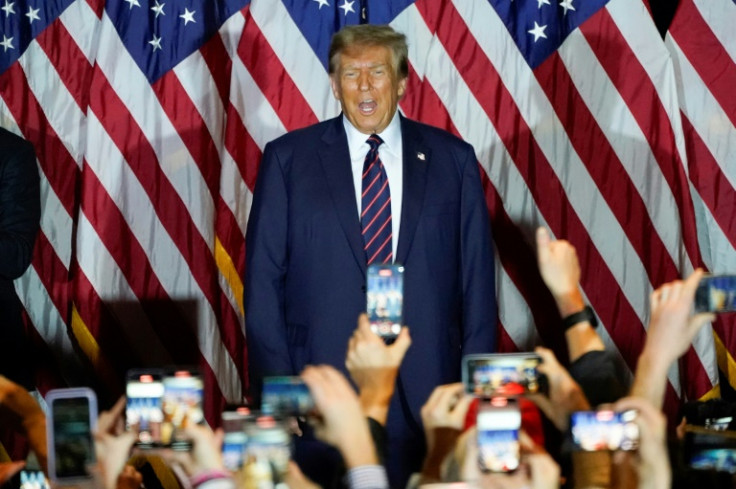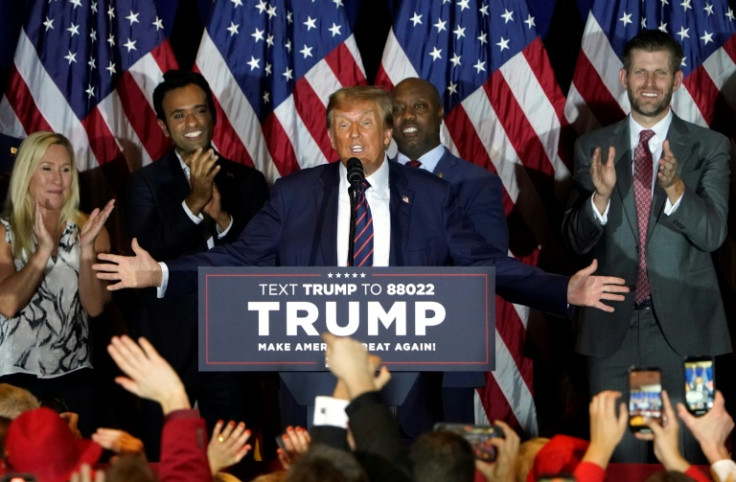
Former US president Donald Trump steamrolled to victory in New Hampshire, brushing aside challenger Nikki Haley and virtually cementing his grip on the Republican nomination as he chases another term in the White House.
Here are five takeaways from Tuesday night.
No Republican who won both Iowa and New Hampshire has ever lost the nomination battle. That historical data point is gold for Trump, now widely seen as the party's presumptive flag-bearer heading into November -- despite multiple legal scandals and a chaos-filled record as president.
The race now turns to Nevada, where Trump is already claiming an all-but-certain victory, and next month to Haley's home state of South Carolina, where he leads the former governor by some 30 percentage points.
All 50 states will have their say in the months-long process, but it is possible the Republicans could have their nominee by April -- or sooner.
"I say the general election begins tonight," former Republican candidate Vivek Ramaswamy, who endorsed Trump after dropping out, said following Tuesday's primary.
Having finished third in Iowa and second in New Hampshire, Haley's position is precarious. But she told supporters she is still in the fight -- at least until South Carolina.
"This race is far from over," she insisted. "South Carolina voters don't want a coronation, they want an election. And we're going to give them one."
But she faces considerable hurdles, including the fact that other defeated rivals and their big donors are already flocking to Trump.
"If Haley cannot compete against Trump in South Carolina, her race is over," Russ Muirhead, a professor of government at Dartmouth College, told AFP.
He swore on live television, called the United States a "failing country" and vowed revenge on rivals -- and that came from the night's winner.
Trump had a clear opportunity to sound magnanimous in victory, but he failed to take it in New Hampshire.
Trump ranted at length about Haley not accepting defeat.
"She failed badly," he said, before switching to rambling tirades about illegal immigration, fuel prices, and his dystopian vision of a nation supposedly falling apart.
He also repeated his false claims that he won the presidential election and the state of New Hampshire in 2020, stated without elaborating that Haley could soon find herself under investigation, and threatened to get back at those who crossed him.
"I don't get too angry, I get even," he boasted.
The Haley campaign responded swiftly.
"If Trump is in such good shape, why is he so angry?" it asked.
New Hampshire exit polls offered intriguing detail about Republican voters -- and raised questions over how Trump will expand beyond his base.
Trump supporters are all-in. Asked whether Trump would be fit to serve as president even if he were convicted of a crime, 87 percent said yes.
Among Haley's more moderate supporters that number sank to 12 percent.
By roughly the same percentage, Trump followers said they did not believe Biden legitimately won the presidency in 2020, while just 13 percent of Haley voters agreed.
The president himself won in New Hampshire too -- and he wasn't even on the ballot.
Because New Hampshire Democrats insisted on holding their primary on Tuesday, against the wishes of the national party, the state's vote became purely symbolic. Biden hadn't even filed candidate paperwork.
He won anyway, thanks to a write-in campaign, handily defeating two little-known Democratic rivals who'd been hoping to seize the limelight.
And while Trump and Haley duked it out, the incumbent took to the campaign stump in swing-state Virginia, where he sought to put reproductive rights front and center of his reelection bid.
Trump was "hell-bent" on further abortion restrictions.
After the New Hampshire vote, Biden put out a statement acknowledging the inevitable: "Trump will be the Republican nominee."
"My message to the country is the stakes could not be higher," Biden said.










